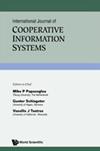使用BSC和COBIT 4.1评估银行公司的信息技术治理
IF 0.8
4区 计算机科学
Q4 COMPUTER SCIENCE, INFORMATION SYSTEMS
International Journal of Cooperative Information Systems
Pub Date : 2021-05-24
DOI:10.29040/IJCIS.V2I2.27
引用次数: 1
摘要
摘要:工业革命4.0时代,企业能否实现自己的愿景和使命目标,很大程度上是由信息技术的作用决定的,尤其是银行公司的BPR PPM,问题在于BPR PPM没有充分认识到管理企业变革的重要性,以维持公司的存在。为了确定一个公司信息技术应用的成熟度,有必要进行全面的评估。在本研究中,Cobit 4.1中有17个过程是在内部平衡计分卡的角度上解决的。Cobit是一个非常适合用于衡量信息技术应用有效性的框架,而平衡计分卡(BSC)是一个非常适合用于衡量或评估公司绩效的框架。这两个框架的结合可以提供一个内部视角的清晰画面,公司领导者可以使用它来改进信息技术治理。本研究得出的结论是,基于Cobit 4.1和内部平衡计分卡视角的业务变更管理方面的公司成熟度水平在具有定义类别的第3级的平均值为2.90。本文章由计算机程序翻译,如有差异,请以英文原文为准。
Evaluation of Information Technology Governance in Banking Companies Using BSC and COBIT 4.1
Abstract - The era of industrial revolution 4.0, the progress of companies to achieve their vision and mission goals, is largely determined by the role of information technology, especially banking companies such as BPR PMM, the problem is that BPR PPM has not fully realized the importance of managing a business change, in order to maintain the company's existence. To determine the maturity level of the application of information technology in a company, it is necessary to conduct a thorough evaluation. In this study, there are seventeen processes in Cobit 4.1 that are solved on an internal balanced scorecard perspective. Cobit is a framework that is very well used in measuring the effectiveness of the application of information technology, while the balanced scorecard (BSC) is a framework that is very suitable to be applied to measure or assess the performance of a company. The combination of the two frameworks can provide a clear picture of internal perspectives that can be used by company leaders in improving information technology governance. This study resulted in a conclusion that the company maturity level in terms of business change management based on Cobit 4.1 and the internal balanced scorecard perspective has an average value of 2.90 at level 3 with defined categories.
求助全文
通过发布文献求助,成功后即可免费获取论文全文。
去求助
来源期刊

International Journal of Cooperative Information Systems
工程技术-计算机:信息系统
CiteScore
2.30
自引率
0.00%
发文量
8
审稿时长
>12 weeks
期刊介绍:
The paradigm for the next generation of information systems (ISs) will involve large numbers of ISs distributed over large, complex computer/communication networks. Such ISs will manage or have access to large amounts of information and computing services and will interoperate as required. These support individual or collaborative human work. Communication among component systems will be done using protocols that range from conventional ones to those based on distributed AI. We call such next generation ISs Cooperative Information Systems (CIS).
The International Journal of Cooperative Information Systems (IJCIS) addresses the intricacies of cooperative work in the framework of distributed interoperable information systems. It provides a forum for the presentation and dissemination of research covering all aspects of CIS design, requirements, functionality, implementation, deployment, and evolution.
 求助内容:
求助内容: 应助结果提醒方式:
应助结果提醒方式:


